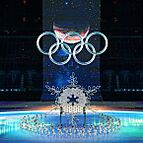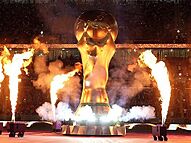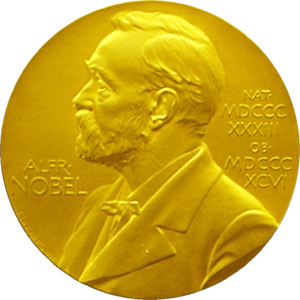2022 facts for kids
- Protests in Aktobe during a period of unrest in Kazakhstan;
- The state funeral procession of Elizabeth II, Queen of the United Kingdom;
- Protestors on Keshavarz Boulevard against the Iranian government associated with the death of Mahsa Amini;
- The 2022 Winter Olympics are held in Beijing, China;
- The 2022 FIFA World Cup is held in Qatar and is won by Argentina;
- The state funeral of former Japanese prime minister Shinzo Abe following his assassination;
- The Antonov An-225 Mriya, the largest aircraft ever built, destroyed in the Battle of Antonov Airport during the Russian invasion of Ukraine;
- The most powerful volcanic eruption of the 21st century occurs when Hunga Tonga–Hunga Haʻapai volcano erupts.
| Millennium: | 3rd millennium |
|---|---|
| Centuries: | 20th century – 21st century – 22nd century |
| Decades: | 1990s 2000s 2010s – 2020s – 2030s 2040s 2050s |
| Years: | 2019 2020 2021 – 2022 – 2023 2024 2025 |
| Gregorian calendar | 2022 MMXXII |
| Ab urbe condita | 2775 |
| Armenian calendar | 1471 ԹՎ ՌՆՀԱ |
| Assyrian calendar | 6772 |
| Bahá'í calendar | 178–179 |
| Balinese saka calendar | 1943–1944 |
| Bengali calendar | 1429 |
| Berber calendar | 2972 |
| British Regnal year | 70 Eliz. 2 – 71 Eliz. 2 |
| Buddhist calendar | 2566 |
| Burmese calendar | 1384 |
| Byzantine calendar | 7530–7531 |
| Chinese calendar | 辛丑年 (Metal Ox) 4718 or 4658 — to — 壬寅年 (Water Tiger) 4719 or 4659 |
| Coptic calendar | 1738–1739 |
| Discordian calendar | 3188 |
| Ethiopian calendar | 2014–2015 |
| Hebrew calendar | 5782–5783 |
| Hindu calendars | |
| - Vikram Samvat | 2078–2079 |
| - Shaka Samvat | 1943–1944 |
| - Kali Yuga | 5122–5123 |
| Holocene calendar | 12022 |
| Igbo calendar | 1022–1023 |
| Iranian calendar | 1400–1401 |
| Islamic calendar | 1443–1444 |
| Japanese calendar | Reiwa 4 (令和4年) |
| Javanese calendar | 1955–1956 |
| Juche calendar | 111 |
| Julian calendar | Gregorian minus 13 days |
| Korean calendar | 4355 |
| Minguo calendar | ROC 111 民國111年 |
| Nanakshahi calendar | 554 |
| Thai solar calendar | 2565 |
| Tibetan calendar | 阴金牛年 (female Iron-Ox) 2148 or 1767 or 995 — to — 阳水虎年 (male Water-Tiger) 2149 or 1768 or 996 |
| Unix time | 1640995200 – 1672531199 |
2022 (MMXXII) was a common year starting on Saturday of the Gregorian calendar, the 2022nd year of the Common Era (CE) and Anno Domini (AD) designations, the 22nd year of the 3rd millennium, the 22nd year of the 21st century, and the 3rd year of the 2020s decade.
The year 2022 was a time of big changes and important events around the world. The COVID-19 pandemic continued, but many countries started to remove restrictions. This allowed people to travel more freely again.
The world's population reached eight billion people in 2022. There were also several major natural disasters. These included powerful hurricanes and a huge volcano eruption. A new artificial intelligence chatbot called ChatGPT was also released, which started a lot of excitement about AI.
One of the most significant events was the Russian invasion of Ukraine. This conflict caused millions of people to leave their homes. It also led to many countries placing sanctions on Russia.
Contents
- Major Conflicts and Global Tensions
- Key Events of 2022
- January: A New Year Begins
- February: Olympics and Invasion
- March: War and Discoveries
- April: Escalation and Space
- May: Global Health and Elections
- June: Earthquakes and Rights
- July: Leadership Changes and Space Images
- August: Tensions and Natural Disasters
- September: Royal Passing and More Conflict
- October: Tragedies and Political Shifts
- November: World Population and Space Missions
- December: Climate and Leadership
- World Population Milestones
- Nobel Prizes
- See also
Major Conflicts and Global Tensions
The Russian Invasion of Ukraine
The biggest conflict in 2022 was the Russian invasion of Ukraine. This war began when Russian President Vladimir Putin announced a "special military operation." He said it was to support Russian-backed regions in eastern Ukraine.
The invasion started on February 24, 2022. Missiles hit cities like Kyiv. This led to a large-scale conflict across Ukraine. Millions of Ukrainians became refugees or were displaced within their own country. Many countries around the world condemned Russia's actions. They placed sanctions on Russia. Russian teams were also excluded from major sporting events.
Other Conflicts Around the World
Other conflicts also continued or grew in 2022. These included fighting in Myanmar and the Tigray War in Ethiopia. These conflicts caused many deaths and much suffering.
Key Events of 2022
January: A New Year Begins
- January 1 – The Regional Comprehensive Economic Partnership began. This is the world's largest free trade area. It includes many countries in Asia and Oceania.
- January 4 – Five permanent members of the UN Security Council made a rare joint statement. They said that "a nuclear war cannot be won and must never be fought."
- January 5 – A state of emergency was declared in Kazakhstan. This happened because of widespread protests.
- January 15 – A huge volcano eruption happened in Tonga. It caused tsunami warnings across the Pacific Ocean.
- January 23 – Tropical Storm Ana caused many deaths in Madagascar, Malawi, and Mozambique.
- January 23 – A military coup took place in Burkina Faso. The president was removed from power.
February: Olympics and Invasion
- February 3 – Islamic State leader Abu Ibrahim al-Hashimi al-Qurashi was killed. This happened during a raid by U.S. special forces in Syria.
- February 4–February 20 – The 2022 Winter Olympics were held in Beijing, China. Beijing became the first city to host both Summer and Winter Olympics.
- February 6 – Queen Elizabeth II celebrated her Platinum Jubilee. This marked 70 years as Queen of the United Kingdom.
- February 21–February 24 – Russia began a full-scale invasion of Ukraine. This led to international condemnation and sanctions.
- February 26 – The EU, US, and allies removed Russian banks from the SWIFT payment system. This caused a financial crisis in Russia.
- February 27 – Russian President Putin ordered Russia's nuclear deterrent forces to be on "special alert." This was in response to NATO statements.
March: War and Discoveries
- March 1 – The United Nations passed a resolution. It deplored Russia's invasion of Ukraine and called for withdrawal.
- March 2 – Russia captured its first large city, Kherson. Over a million refugees had fled Ukraine by this date.
- March 3 – Russia was condemned for an attack on the Zaporizhzhia Nuclear Power Plant. This is the largest nuclear plant in Europe.
- March 4–March 13 – The 2022 Winter Paralympics were held in Beijing, China.
- March 5 – Researchers in the Antarctic found the shipwreck of Endurance. This ship sank in 1915 during Ernest Shackleton's expedition.
- March 7 – The global death toll from COVID-19 passed 6 million.
- March 8 – The US and UK announced a ban on Russian oil.
- March 21 – China Eastern Airlines Flight 5735 crashed in China. All 133 people on board died.
April: Escalation and Space
- April 3 – As Russian forces left areas near Kyiv, Ukraine accused them of war crimes. Evidence of civilian killings, like the Bucha massacre, emerged.
- April 7 – The UN voted to suspend Russia from the Human Rights Council.
- April 8 – Russia was condemned for a missile attack on Kramatorsk train station. This attack killed 59 civilians, including children.
- April 14 – The Russian flagship Moskva sank. Ukraine claimed to have hit it with missiles.
- April 20 – Astronomers announced the discovery of micronovae. These are a new type of exploding star.
- April 22 – The Large Hadron Collider restarted full operations. It had been shut down for upgrades.
- April 25 – Elon Musk agreed to buy the social media network Twitter.
May: Global Health and Elections
- May 6 – An outbreak of monkeypox began. The first case was reported in London, UK.
- May 9 – Bongbong Marcos and Sara Duterte were elected President and Vice President of the Philippines.
- May 10–May 14 – The Eurovision Song Contest 2022 was held in Italy. Ukraine's Kalush Orchestra won.
- May 12 – The Event Horizon Telescope released its first image of Sagittarius A*. This is the supermassive black hole at the center of the Milky Way.
- May 18 – Finland and Sweden applied to join NATO.
- May 24 – A tragic school shooting occurred in Uvalde, Texas. 19 students and two teachers were killed.
June: Earthquakes and Rights
- June 4 – Retired general Bajram Begaj was elected President of Albania.
- June 5 – At least 50 people were killed in an attack in Owo, Nigeria.
- June 14 – Canada and Denmark ended their dispute over Hans Island. They divided the island in half.
- June 22 – A strong earthquake struck Afghanistan and Pakistan. It killed at least 1,163 people.
- June 23 – The European Council granted Moldova and Ukraine candidate status to join the European Union.
July: Leadership Changes and Space Images
- July 7 – UK Prime Minister Boris Johnson announced his intention to resign. This followed a series of resignations from his government.
- July 8 – Former Prime Minister of Japan Shinzo Abe was assassinated during a speech in Nara, Japan.
- July 11 – The first operational image from the James Webb Space Telescope was revealed. It showed the galaxy cluster SMACS 0723.
- July 18 – Droupadi Murmu was elected President of India. She became the first tribal and youngest person in this role.
- July 21 – Ranil Wickremesinghe was elected President of Sri Lanka. This happened after protests over an economic crisis.
- July 22 – Russia and Ukraine signed the Black Sea Grain Initiative. This agreement helped ship grain exports and lower global food prices.
- July 23 – The World Health Organization (WHO) declared the monkeypox outbreak a global health emergency.
- July 31 – Ayman al-Zawahiri, the leader of al-Qaeda, was killed in an airstrike in Afghanistan.
August: Tensions and Natural Disasters
- August 4 – China conducted its largest ever military exercise around Taiwan. This was in response to a visit by US official Nancy Pelosi.
- August 17 – Turkey and Israel agreed to restore full diplomatic relations.
- August 28 – Pakistan declared a "climate catastrophe." The death toll from flooding exceeded 1,000 people.
- August 30 – Mikhail Gorbachev, the last leader of the Soviet Union, died at age 91.
September: Royal Passing and More Conflict
- September 1 – The UN released a report. It stated that China's treatment of Uyghurs might be crimes against humanity.
- September 8 – Queen Elizabeth II of the United Kingdom died at age 96. Her son Charles III became King.
- September 16 – Protests erupted in Iran. This followed the death of Mahsa Amini while in the custody of the "morality police."
- September 19 – The state funeral of Elizabeth II was held in London.
- September 21 – Russian President Putin announced a partial mobilisation of Russia. He also threatened nuclear retaliation.
- September 26 – NASA's DART spacecraft crashed into the asteroid Dimorphos. This was a test for planetary defense.
- September 27–September 30 – Hurricane Ian caused severe damage in Cuba and the United States.
- September 30 – Russia formally annexed four occupied regions of Ukraine. This was widely seen as a breach of international law.
October: Tragedies and Political Shifts
- October 1 – A fatal crowd crush occurred at a football match in Indonesia. It killed 135 people.
- October 8 – An explosion occurred on the Crimean Bridge. This bridge connects Crimea and Russia.
- October 20 – Liz Truss announced her resignation as UK Prime Minister. She had been in office for 45 days.
- October 25 – Rishi Sunak became Prime Minister of the United Kingdom. He was the first person of color to hold the position.
- October 29 – At least 158 people died in a crowd crush during Halloween festivities in Seoul, South Korea.
- October 30 – Luiz Inácio Lula da Silva defeated Jair Bolsonaro to become President of Brazil.
- October 30 – The collapse of a suspension bridge in India killed at least 135 people.
November: World Population and Space Missions
- November 2–November 3 – The Ethiopian government and the TPLF signed a peace agreement. This aimed to end the Tigray War.
- November 11 – The cryptocurrency exchange FTX filed for bankruptcy. This affected the cryptocurrency world.
- November 11 – Ukrainian forces recaptured Kherson. This was the only regional capital taken by Russia since the war began.
- November 15 – The world population reached 8 billion people.
- November 16 – NASA launched Artemis 1. This was the first uncrewed mission of its powerful Space Launch System rocket.
- November 20–December 18 – The 2022 FIFA World Cup was held in Qatar. Argentina won the tournament.
- November 30 – OpenAI released ChatGPT. This artificial intelligence chatbot can answer questions and write essays.
December: Climate and Leadership
- December 2 – The G7 and Australia joined the EU in setting a price cap on Russian crude oil.
- December 5 – The National Ignition Facility achieved fusion ignition. This was a big step in developing nuclear fusion power.
- December 7 – The Congress of Peru removed President Pedro Castillo from office. Vice President Dina Boluarte became the first female President of Peru.
- December 7 – China eased its Zero-COVID policies after protests.
- December 19 – Nearly 200 countries agreed to a landmark deal at the 2022 United Nations Biodiversity Conference. They aimed to protect a third of the planet for nature by 2030.
- December 21–December 26 – A major winter storm hit the northern United States and southern Canada. It caused many deaths and travel problems.
- December 29 – Brazilian football legend Pelé died at age 82.
- December 31 – Former Pope Benedict XVI died at age 95.
World Population Milestones
The world population was estimated to have reached 8 billion people on November 15, 2022. China was the most populated country, followed by India. Africa was the continent with the fastest population growth.
Nobel Prizes
| Category | Recipient | Country | Reason for Award |
|---|---|---|---|
| Chemistry | Carolyn Bertozzi | For developing "click chemistry" and "bioorthogonal chemistry." These are ways to build molecules and study them in living things. | |
| Morten P. Meldal | |||
| Karl Barry Sharpless | |||
| Economics | Ben Bernanke | For their research on banks and financial crises. Their work helps us understand how to prevent economic problems. | |
| Douglas Diamond | |||
| Philip H. Dybvig | |||
| Literature | Annie Ernaux | For her brave and clear writing about personal memory and society. | |
| Peace | Ales Bialiatski | For their efforts to document war crimes, human rights abuses, and the misuse of power in their home countries. | |
| Memorial | |||
| Center for Civil Liberties | |||
| Physics | Alain Aspect | For experiments with entangled photons. Their work helped develop quantum information science. | |
| John Clauser | |||
| Anton Zeilinger | |||
| Physiology or Medicine | Svante Pääbo | For his discoveries about the genes of extinct human relatives and human evolution. |
See also
 In Spanish: 2022 para niños
In Spanish: 2022 para niños
 | Sharif Bey |
 | Hale Woodruff |
 | Richmond Barthé |
 | Purvis Young |










